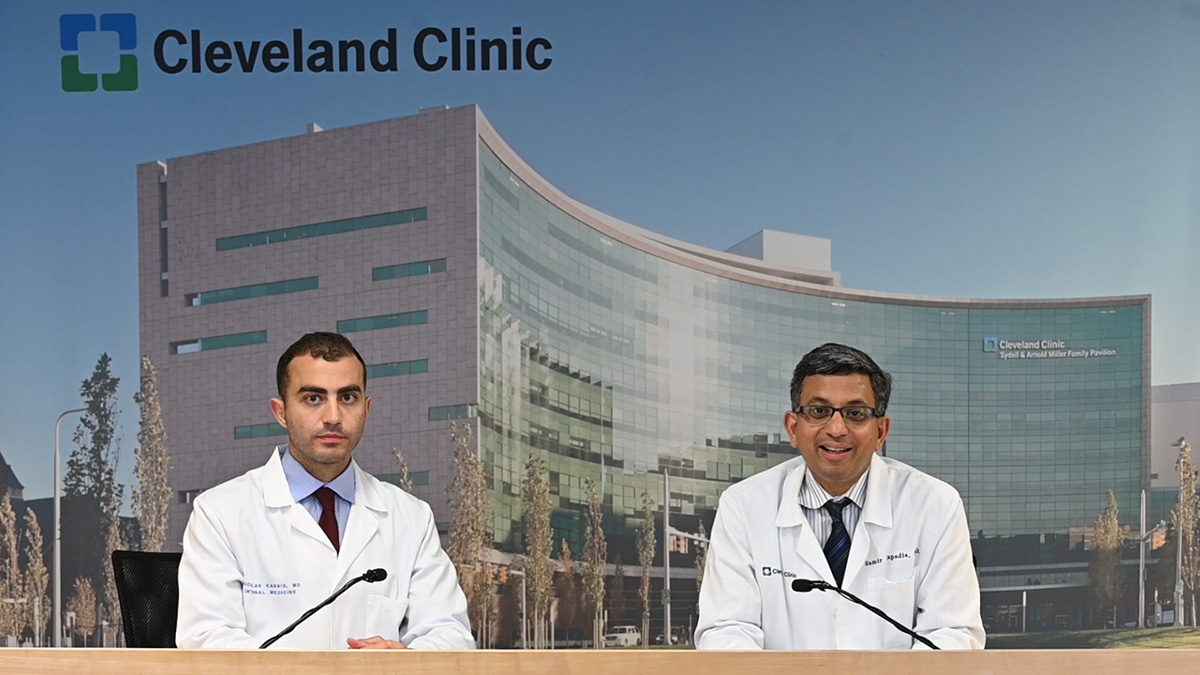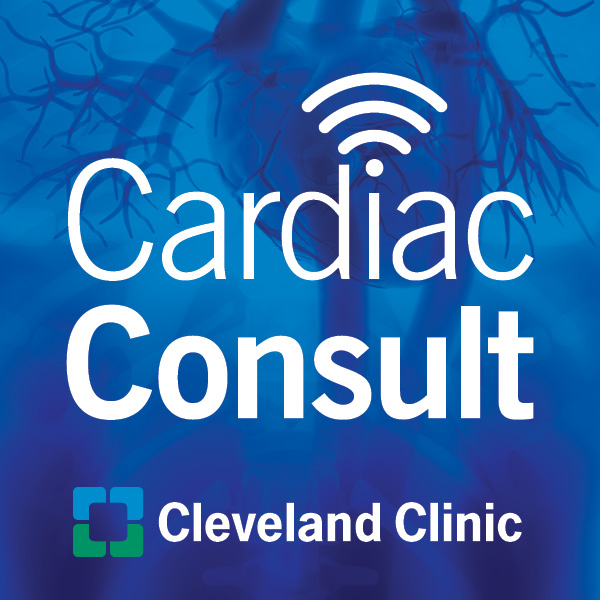Are Calcium Supplements Causing More Harm to The Heart than Good?

Calcium metabolism has long been implicated in aortic stenosis. Dr. Samir Kapadia and Dr. Nicholas Kassis discuss supplemental calcium, both with and without vitamin D, and it how it relates to aortic stenosis, need for aortic valve replacement, and mortality.
Learn more about the Valve Center at Cleveland Clinic.
Learn more about resources for medical professionals from Cleveland Clinic.
Kassis, N., Hariri, E. H., Karrthik, A. K., Ahuja, K. R., Layoun, H., Saad, A. M., Gad, M. M., Kaur, M., Bazarbashi, N., Griffin, B. P., Popovic, Z. B., Harb, S. C., Desai, M. Y., & Kapadia, S. R. (2022). Supplemental calcium and vitamin D and long-term mortality in aortic stenosis. Heart (British Cardiac Society), 108(12), 964–972. https://doi.org/10.1136/heartjnl-2021-320215
Subscribe: Apple Podcasts | Buzzsprout | Spotify
Are Calcium Supplements Causing More Harm to The Heart than Good?
Podcast Transcript
Announcer:
Welcome to Cleveland Clinic Cardiac Consult, brought to you by the Sydell and Arnold Miller Family Heart, Vascular and Thoracic Institute at Cleveland Clinic.
Samir Kapadia, MD:
Hello everybody. I'm Samir Kapadia, cardiologist and chairman of division of cardiology here at Cleveland Clinic. And I have with me today Dr. Nick Kassis. He's a third year resident in Cleveland Clinic, and he's applying for the cardiology fellowship for the next year, and we are very excited to have him here as our expert today, presenting a very nice study that he has conducted at Cleveland Clinic. So Nick, just to summarize that what is the population and what was the question that you were trying to answer initially when we designed this study?
Nicholas Kassis, MD:
So in thinking about sort of this study, we know that dysregulated calcium metabolism is implicated in aortic stenosis. And we know that calcium supplementation, vitamin D supplementation, both are very widespread, particularly in the west and the United States. More than 40% of the population are on these. So knowing that and knowing that it's implicated in aortic stenosis, we wanted to see are calcium supplements causing more harm than good in this patient population? And the population that we looked at were those who had mild to moderate aortic stenosis. So it ended up being about 2,600 to 2,700 patients. And that's what we did, yeah.
Samir Kapadia, MD:
Wonderful. So I think the important question is that a lot of people come to our clinics with the idea that they have moderate aortic stenosis or mild aortic stenosis, and they ask this question, "What can I do differently to prevent the progression of aortic stenosis?" So the first question that came to mind is that, okay, well, this is calcification. Should they take calcium supplements? So this is a common patient question that patient asks, that, "I'm taking the calcium supplement. This is safe to take calcium supplements?" So it is a direct patient related question that we are trying to answer.
Samir Kapadia, MD:
The second, so you are absolutely right that we did 2,600, so not a small number of patients. This is Cleveland Clinic, we have a large number of patients. So we could go back and study this moderate calcified aortic valve to answer patient's question.
Nicholas Kassis, MD:
Exactly.
Samir Kapadia, MD:
Now, what did you find when you looked at it? It was kind of surprising, but what were the main three findings from the study?
Nicholas Kassis, MD:
So our findings were threefold. You see, the main finding that was somewhat surprising was the such high mortality rate that we found in those who supplemented with calcium, almost double the rate with calcium supplementers versus non-supplementers. So that was one main finding. The second was the increased need of aortic valve replacement in those who are supplementing with calcium. And the third is despite this increased need of aortic valve replacement, we found no significant difference in the progression of aortic stenosis between the groups, between those who supplemented calcium versus vitamin D, versus no supplementation.
Samir Kapadia, MD:
Right. And this is a little bit of a limitation of the study in the sense that when we are saying the progression, we have only so many different ways that we can determine the progression of the aortic valve. And this was a retrospective study, so we didn't have each time points for every patient to say that when they started the calcium supplements and how fast the disease is progressing. So this is a little bit of a challenge when you're trying to do a retrospective study. What do you think, what is the mechanism? Is it a cause effect relationship, or is it more often association that at least we have proven?
Nicholas Kassis, MD:
Yeah, so that's a very good question. I think this is something that's still being actively investigated. And I think if you took the sum of the literature out there, studies showing that calcium supplementations associated with other sort of cardiovascular harms, things like vascular calcification, MI, stroke, increased mortality in different patient populations, taking that, and also taking these prior studies that have shown that supplemental and not dietary calcium is associated with these worse outcomes, it's highly suggestive. It's certainly a risk association, but one wonders whether this is cause and effect. I think future directions is looking at things, as you sort of alluded to, like getting CT scans, looking at the calcification of the valve itself and seeing if it's directly causing that or not. But I think the short answer is to be determined, but highly suggestive at this point.
Samir Kapadia, MD:
Right. And I agree with you, that I think that if you take the entire literature available in consideration, putting everything together, it stands to reason that if you are taking supplemental calcium, your patients are taking supplemental calcium, it is important to understand that why they're taking it, and if it's absolutely necessary or not. If it's not totally necessary, how you determine that is taking the dietary calcium in consideration, that if they're making 1200 milligrams per day or not.
Samir Kapadia, MD:
If they're taking it, fair enough, you don't need to additionally supplement it. If they're not, then look at the dietary patterns to try to understand that how we can supplement with the dietary calcium. And then the third thing would be to say that if you need to supplement the calcium, then that part we don't know in this particular study, the dose response.
Nicholas Kassis, MD:
That's right.
Samir Kapadia, MD:
But that is something to, again, in the future. We'll try to understand if there is a dose response call. Is that an accurate statement?
Nicholas Kassis, MD:
That's perfect. Yeah.
Samir Kapadia, MD:
Right. Of course, this is for the future, but before we go to the future, what do you think that the vitamin D3 in this particular study, what was the take home message for vitamin D3?
Nicholas Kassis, MD:
Yeah. I think it's sort of in line with the literature in that taking vitamin D3 supplements does not cause cardiovascular harm or is not associated with cardiovascular harm, but looking at prior studies, including randomized trials that didn't show a benefit of taking vitamin D3, I would say it's sort of neutral. I would say if you need it, certainly take it. And it's most likely not causing any cardiovascular harm at the same time.
Samir Kapadia, MD:
Right. And I think that personally, vitamin D3 can have several positive effects. The good news about vitamin D3 is that you can measure the levels. So if the levels are super low, that may be an advantage of supplementing the vitamin D3, especially there's some literature, again, all these literature is plus/minus to say that you can increase immunity, you can decrease the side effects of statins, for example. Some people have some evidence to say that there is some decrease in the diabetes with D3. So in the clinical practice, I think the take home message is that D3 is not that harmful as taking a calcium supplement, and there may be a benefit beneficial effect, especially if your D3 levels are lower.
Samir Kapadia, MD:
Now, the second question, this is a research side of it, is what is the role of vitamin K2 in this big picture?
Nicholas Kassis, MD:
Right. Right. So vitamin K2, and there's a lot of data coming out recently showing that it's implicated in vascular calcification, and with that medicines that affect vitamin K2, like warfarin, are also implicated. And so there's a recent trial that came out showing potentially there might not be any benefit of vitamin K2 and D taken together. However, there are many limitations to that study, and there's still data to suggest that there might be still an association with improved outcomes with vitamin K in terms of arterial stiffness and endothelial function and even cardiac remodeling as well. So I think it's still too early to say, and I think more trials need to come out with vitamin K just to show, but...
Samir Kapadia, MD:
So this is our research interest to say that how we are going, we are actively studying vitamin K2. And can you just let them know where the vitamin K2 comes from? Because vitamin K people know fairly commonly what is a source, but for the K2, it is not the green leafy vegetables. But where do you get the vitamin K2?
Nicholas Kassis, MD:
Fermented foods more commonly. So a lot of sort of fermented foods, beans, milk, things like that, you can get it.
Samir Kapadia, MD:
Milk, cheese, fermented foods.
Nicholas Kassis, MD:
Yeah.
Samir Kapadia, MD:
So cheese, also dairy. So this is a different kind of a vitamin compared to the regular vitamin K that people know from green leafy vegetables. So the final question is that what are the new areas where, so I would say that in this particular study, we looked at the moderate aortic stenosis or mild aortic stenosis, but what about the prosthetic valves? What about the patients who have coronary calcification? What about the patients who have family history of vavular heart disease? All these people are studied, or these are of course our research interest, but what do you think where the field is going?
Nicholas Kassis, MD:
Yeah. I think there's sort of two sides of the coin here. Ultimately the best thing to do would be to perform randomized trials looking at calcium. The issue is looking at randomized trials for harm is not necessarily the best sort of approach. And so I'd say like, as you mentioned things, looking at dose dependent response, certain populations that we excluded, things like those with prior valve replacements, those are all sort of important questions to answer. And the combination of calcium plus vitamin D versus not with vitamin D is also one to sort out.
Samir Kapadia, MD:
Excellent. So again, thank you again for joining us. And it was a great presentation. Thank you.
Announcer:
Thank you for listening. We hope you enjoyed the podcast. We welcome your comments and feedback. Please contact us at heart@ccf.org. Like what you heard? Subscribe wherever you get your podcasts or listen at clevelandclinic.org/cardiacconsultpodcast.

Cardiac Consult
A Cleveland Clinic podcast exploring heart, vascular and thoracic topics of interest to healthcare providers: medical and surgical treatments, diagnostic testing, medical conditions, and research, technology and practice issues.



